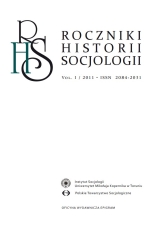Polska socjologia wsi okresu transformacji ustrojowej (perspektywa teoretyczno-metodologiczna)
Abstract
The system transformation faced the Polish rural sociology with some new and difficult challenges connected with analysis of social effects resulting from the process of the state and society transition from the totalitarian into democratic system. The studies that focus on these issues are carried out within the two theoretical orientations. According to the former one, which refers to modernization theories, the desirable direction of changes in rural area and agriculture is dependent on their further urbanization and industrialization through implementation of the social practice based on a market model of development. The latter orientation, clearly antimodernization one, refers to the concepts of endogenous and sustainable development, and emphasizes the necessity to retain family farms and to perceive rural area as the set of timeless and invaluable ecological and socio-cultural values Theoretical basis of Polish rural sociology that focuses on the period of system transformation is unique for its diversity of classifications and explanations, as well as lack of some coherent theory if rural development; not to mention the theory of its development in the country under social system transformation. Some stabile methodological foundations are indispensable for good level of empirical research. Although, quantitative methods prevail which resolve to ratios in their accounts, to diagnostic surveys when solving given study problems, or to techniques of interview or questionnaire as the main way to find facts, but the presence of the so-called anthropological perspective is still noticeable.
 Roczniki Historii Socjologii
Roczniki Historii Socjologii